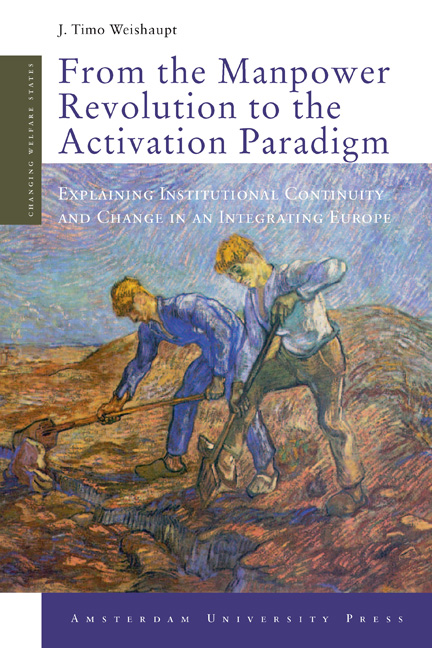 From the Manpower Revolution to the Activation Paradigm
From the Manpower Revolution to the Activation Paradigm Book contents
- Frontmatter
- Contents
- List of Boxes, Figures and Tables
- Abbreviations
- Acknowledgements
- I Introduction
- II Theoretical Approach
- Part I Origin and Crisis of European Labour Market Policy Regimes
- Part II The Emergence of the Activation Paradigm
- List of Interviews and Personal Conversations
- Notes
- Bibliography
- Index
- Changing Welfare States
V - The OECD’s Repeated Reassessments and the EU as a Proliferator of New Ideas
Published online by Cambridge University Press: 20 January 2021
- Frontmatter
- Contents
- List of Boxes, Figures and Tables
- Abbreviations
- Acknowledgements
- I Introduction
- II Theoretical Approach
- Part I Origin and Crisis of European Labour Market Policy Regimes
- Part II The Emergence of the Activation Paradigm
- List of Interviews and Personal Conversations
- Notes
- Bibliography
- Index
- Changing Welfare States
Summary
Chapter III examined the emergence of active manpower policy – inspired by the Swedish Model and diffused by the OECD – across most of the industrialised world. Chapter IV outlined the expansion, recalibration, and – in most cases – gradual expansion in the use of active manpower policy in response to the employment challenges that arose after the two oil crises in the 1970s. In this chapter, I will trace how the OECD has reacted to – and repeatedly adjusted its position on – the causes of, and remedies for, unemployment since the late 1980s. I will juxtapose the OECD's recommendations to those of the EU, which emerged in the mid-1990s as an additional “ideas proliferator” and locus for new policy agendas. I argue that while the authors of the OECD and EU statements initially offered competing sets of recommendations – based on different normative and cognitive underpinnings – a gradual phase of normative and cognitive recalibrations has subsequently led to programmatic convergence on a common paradigm based on activation policies.
The New Aspiration for an “Active Society” and the Road to the OECD Jobs Study
Possibly one of the most striking developments in OECD countries during the 1980s was the diversity in both the level and structure of unemployment. While unemployment began to decline in some European countries as part of a general economic upswing in the mid-1980s, in many others, unemployment remained a salient issue. Moreover, many countries shared – even those with a better record such as Austria – the phenomenon of persistent and long-term unemployment, which was concentrated in particular groups, especially youth. At the same time, employers in many countries began to report skills shortages, which highlighted the increasing mismatch of jobseekers’ skills and employers’ demands (for an excellent review, see Blanchard 2006). These economic, political, and social challenges were further amplified by demographic developments that suggested that economic old-age dependency ratios would significantly rise (as birth rates declined and people grew older), which, in turn, increased concern about the sustainability of old age social security systems.
When a cyclical economic upswing contributed to continuously falling average levels of unemployment from 1984 to 1990, the OECD seized this opportunity to propose a New Framework, endorsing an “active society” (OECD 1990b) that was welcomed by the Ministerial Council.
- Type
- Chapter
- Information
- From the Manpower Revolution to the Activation ParadigmExplaining Institutional Continuity and Change in an Integrating Europe, pp. 151 - 192Publisher: Amsterdam University PressPrint publication year: 2012


